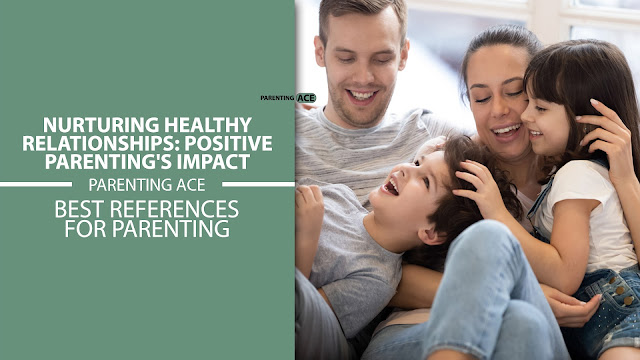Nurturing Healthy Relationships: The Impact of Positive Parenting Practices
Welcome to our latest blog post where we explore the intricate interplay between positive parenting practices and the cultivation of healthy relationships. From the earliest interactions within the family unit to the dynamics of intimate partnerships, we delve into how the nurturing environment created by positive parenting lays the foundation for meaningful connections throughout life. Join us as we unravel the profound impact of parental warmth, effective communication, and conflict resolution skills on shaping individuals' abilities to form and sustain fulfilling relationships, both personally and professionally.
 |
| Nurturing Healthy Relationships: Positive Parenting's Impact |
Healthy relationships are the cornerstone of a fulfilling life, and they often find their roots in the dynamics of family life and upbringing. Positive parenting practices play a pivotal role in shaping the way individuals perceive, form, and maintain relationships throughout their lives. In this article, we delve into the profound impact of positive parenting practices on the development of healthy relationships, exploring how the nurturing environment created within families sets the stage for meaningful connections in the broader social sphere.
Understanding Positive Parenting Practices
Positive parenting practices are characterized by warmth, support, clear communication, and consistent discipline. Unlike authoritarian or neglectful approaches, positive parenting fosters an environment of trust, respect, and mutual understanding between parents and children. It involves acknowledging and nurturing children's emotions, encouraging autonomy within reasonable boundaries, and modeling healthy relationship behaviors through parental actions.
The Influence on Relationship Formation
Children raised in environments characterized by positive parenting practices are more likely to develop secure attachment styles, which serve as the foundation for healthy relationships later in life. Securely attached individuals tend to have greater self-esteem, empathy, and emotional regulation skills, all of which contribute to the formation of deep, meaningful connections with others. Moreover, positive parenting instills values such as empathy, kindness, and cooperation, which are essential for building and sustaining healthy relationships.
Navigating Conflict and Communication
One of the key aspects of healthy relationships is the ability to navigate conflict constructively and communicate effectively. Positive parenting practices teach children essential conflict resolution skills, such as active listening, perspective-taking, and compromise. By modeling respectful communication and problem-solving strategies, parents provide children with valuable tools for resolving conflicts in their own relationships later in life. Additionally, positive parenting fosters open communication channels between parents and children, creating an environment where feelings and concerns can be openly discussed and addressed.
Impact on Intimate Relationships
The influence of positive parenting extends beyond parent-child relationships to intimate partnerships. Individuals who have experienced supportive, nurturing parenting are more likely to seek out and maintain healthy romantic relationships characterized by mutual respect, trust, and emotional intimacy. They are better equipped to communicate their needs and boundaries, navigate challenges together, and sustain long-term connections built on a foundation of love and understanding.
In conclusion, positive parenting practices have a profound impact on the development of healthy relationships across the lifespan. By creating nurturing, supportive environments within families, parents lay the groundwork for children to cultivate secure attachments, effective communication skills, and conflict resolution abilities. These skills, in turn, contribute to the formation of meaningful connections with others, fostering resilience, happiness, and fulfillment in both personal and professional spheres. As we strive to raise the next generation, let us recognize the transformative power of positive parenting in shaping a world built on compassion, empathy, and strong, healthy relationships.



Comments
Post a Comment